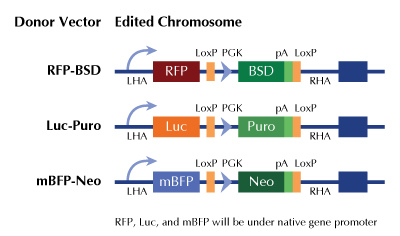CAMK2A Human Gene Knockout Kit (CRISPR)
CAT#: KN205202BN
CAMK2A - human gene knockout kit via CRISPR, HDR mediated
Functional Cassette: GFP-puro Luciferase-Puro RFP-BSD
HDR-mediated knockout kit validation
USD 1,657.00
4 Weeks*
USD 450.00
USD 457.00
Specifications
| Product Data | |
| Format | 2 gRNA vectors, 1 mBFP-Neo donor, 1 scramble control |
| Donor DNA | mBFP-Neo |
| Symbol | CAMK2A |
| Locus ID | 815 |
| Components |
KN205202G1, CAMK2A gRNA vector 1 in pCas-Guide CRISPR vector KN205202G2, CAMK2A gRNA vector 2 in pCas-Guide CRISPR vector KN205202BND, donor DNA containing left and right homologous arms and mBFP-Neo functional cassette. GE100003, scramble sequence in pCas-Guide vector |
| Disclaimer | These products are manufactured and supplied by OriGene under license from ERS. The kit is designed based on the best knowledge of CRISPR technology. The system has been functionally validated for knocking-in the cassette downstream the native promoter. The efficiency of the knock-out varies due to the nature of the biology and the complexity of the experimental process. |
| Reference Data | |
| RefSeq | NM_015981, NM_171825, NM_001363989, NM_001363990, NM_001369025 |
| UniProt ID | Q9UQM7 |
| Synonyms | CAMKA |
| Summary | The product of this gene belongs to the serine/threonine protein kinases family, and to the Ca(2+)/calmodulin-dependent protein kinases subfamily. Calcium signaling is crucial for several aspects of plasticity at glutamatergic synapses. This calcium calmodulin-dependent protein kinase is composed of four different chains: alpha, beta, gamma, and delta. The alpha chain encoded by this gene is required for hippocampal long-term potentiation (LTP) and spatial learning. In addition to its calcium-calmodulin (CaM)-dependent activity, this protein can undergo autophosphorylation, resulting in CaM-independent activity. Several transcript variants encoding distinct isoforms have been identified for this gene. [provided by RefSeq, Jun 2018] |
Documents
| Product Manuals |
| FAQs |
| SDS |
Resources
Other Versions
| SKU | Description | Size | Price |
|---|---|---|---|
| KN205202 | CAMK2A - human gene knockout kit via CRISPR, HDR mediated |
USD 1,657.00 |
|
| KN205202LP | CAMK2A - human gene knockout kit via CRISPR, HDR mediated |
USD 1,657.00 |
|
| KN205202RB | CAMK2A - human gene knockout kit via CRISPR, HDR mediated |
USD 1,657.00 |
|
| KN405202 | CAMK2A - KN2.0, Human gene knockout kit via CRISPR, non-homology mediated. |
USD 1,657.00 |
|
| GA100568 | CAMK2A CRISPRa kit - CRISPR gene activation of human calcium/calmodulin dependent protein kinase II alpha |
USD 1,657.00 |
{0} Product Review(s)
Be the first one to submit a review






























































































































































































































































 Germany
Germany
 Japan
Japan
 United Kingdom
United Kingdom
 China
China
